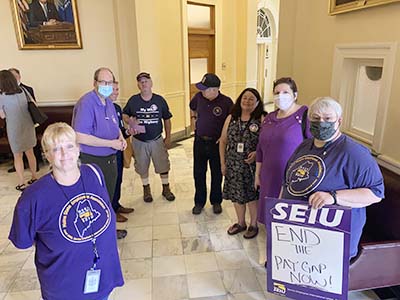Bargaining News
|March 9, 2023
Low pay makes recruitment a tough sell for Maine Forest Service

MSEA-SEIU Member Randy Lagasse, who works as a forester for the Maine Forest Service, testified as a private citizen Feb. 28 before the Legislature’s Appropriations and Agricultural, Conservation and Forestry committees in support of ending the State Employee Pay Gap.
February 27th, 2023
To whom It May Concern,
My name is Randy Lagasse, I live in northern Maine and have worked in the woods most of my life. I am 58 years old and have been a state employee for 24 years. I have held a state forester position now for some time. I am writing this testimony on my own time.
For a long time, being a state employee meant, good benefits, defined pension retirement and a generous health care package. When I first started in 1998 health insurance was free. Now I pay $50 per month just for myself.
Mobility in moving to and from private and public sector jobs is practically impossible once you have been vested with the state of Maine. This I consider a disadvantage for leverage of improving one’s professional career. Someone told me working for the state is “like being in the mafia – you can’t leave”. This is an impediment that should be compensated for.
Our division, (Maine Forest Service) is uncompetitive with the private sector in our hiring process and employee retention. For example, just recently we had two great forester position openings located in the central and southern Maine area that only revealed one qualified candidate. Granted the employee market is unprecedented at this time but it shows the reluctance of the workforce considering being a public servant.
The idea of better benefits and work life balance for state employees leveled the playing field has not come to be proven. The private sector foresters are better paid, enjoy the use of company vehicles on non-work-related uses. State employees do not have that added benefit. Private company foresters have free use of company lands, camps, and equipment such as snowmobiles and ATV’s. To be certain, we do not want to use these things on “time off” as that can create much controversy and problems, but fringe benefits are a major reason why the private sector is at an advantage. And they can bring their dog to work!
Throughout my entire career, I have seen the equivalent private sector more up to date on technology and peripherals and current on innovation and workflow challenges. The state has reacted to new stuff with tepidity.
And finally, State employees are public servants that must be much more cognizant in public of their opinions, cannot run for certain offices and can run into “conflicts of interest”. This as well, is not compensated for.
The Compensations and Classification study proves the discrepancies and should be used to create a better state workforce.
Thank you for your time and consideration,
Randy Lagasse